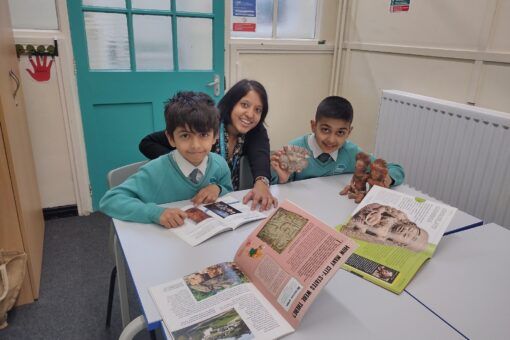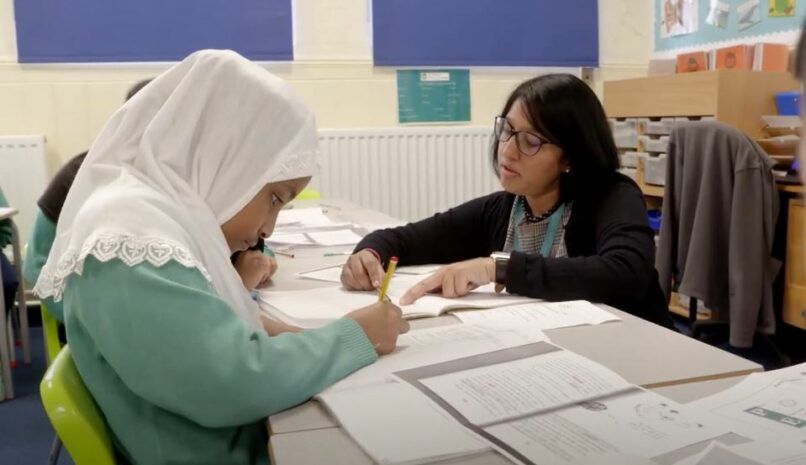
Ark Tindal Primary Academy in Birmingham was recently awarded a Silver Quality Mark by the Historical Association (HA), recognising their excellent history provision. The Association said: “The subject leadership is outstanding” and praised the subject lead who had “strengthened the subject immeasurably” and was described as “a guiding light”. The report was referring to Shima Sinha, and we spoke with her about her love of History. This is the latest article in our #ArkPeople series.
Getting into teaching
I was always interested in History. When I was younger, I had a poster of Tutankhamun’s death mask on my bedroom wall, and I was just amazed by how he could be a king at nine years old, which sparked my passion. However, like many young people, I wasn’t sure what career I wanted to go into after leaving school. I’d always been attracted to social change and human social behaviour, leading me to study Sociology at the University of York. After graduating, I had temporary jobs in the public sector, from working in a library to working in the NHS as a research assistant for a professor.
I enjoyed helping people, and I started volunteering every week at a Saturday school, which operated in a deprived area in Birmingham. Watching other teachers inspired me, and I did my Teaching English as a Foreign Language (TEFL) certificate first, followed by a PGCE.
I taught for three years at different academy schools before joining Ark Tindal in September 2018 as a Year Group Lead. Initially, I was a deputy in English before becoming the History Lead in September 2019 and, in 2021, the Humanities Lead.
Redesigning the History provision
I was on the National Professional Qualification for Middle Leadership (NPQML) 2019 cohort, and my impact project was to design and implement a new History curriculum. Being on the programme taught me how to exploit different leadership and communication styles to execute a new curriculum as there were areas we needed to strengthen and improve.
We created a bespoke learning programme for our pupils because many of our children don’t have English as their first language. We looked at what the national curriculum requires and developed our handbook to suit our children. That journey has taken us more than two years, with lots of feedback from Tindal teachers and others in the network. We also made links with the Balsall Heath History Society because connecting the school to the community is always good.
We now have five curriculum threads running through our curriculum (sustainability, belonging, civilisation, social justice and technological advancement) that support pupils’ understanding of historical concepts such as continuity and change, cause and consequence, similarity, difference and significance.
Our curriculum aims to prepare pupils for a life without limits. We want pupils to be conscious of their impact on the world and be curious about the world around them. It has been carefully designed to ensure pupils think critically, converse confidently, and desire to read, know, and remember more about the world.
I did a lot of this during the lockdown while ensuring that teaching continued in the classroom and online to keep the momentum going.
Gaining the History Quality Award
The History curriculum has been designed to include:
- Core knowledge
- The development of historical skills
- Include the reading of primary and secondary sources
- Key vocabulary
- Develop pupils’ historical enquiry skills by thinking critically, weighing evidence and developing perspective and judgment
- Handling of artefacts and participating in experiences (workshops and trips)
- Develop pupils’ oracy skills through presentations, role-play, arguments and debates
When the History inspector visited, he was impressed by how much knowledge pupils had, the sequencing of lessons and how this crossed other subjects. For example, Year 5 had learned about sustainability in Geography; they could refer to what they learnt about Ancient Egypt in Year 4 (how they used raw materials to build their homes and used the River Nile for farming and drinking water) and apply this to how the Mayans survived using raw materials in Central America.
We’re also working with an external company to run history workshops and pupils are always excited when they come in as it helps consolidate their learning. They remember more by the end of the topic, and the way we teach it means the core knowledge is retained, and they can recall information that was taught to them months earlier.

Engaging with families
It’s been great having families so involved with the changes, and we’ve held coffee mornings to explain what their children will be learning in a particular topic. We’ve developed a knowledge organiser, which they receive at the beginning of term, and the core knowledge of topics is linked to the curriculum threads. We encourage parents to quiz their children using the knowledge organiser and upload it to SeeSaw. We ask parents to quiz their child about the key facts, the key vocabulary and the threads and the concepts as well, and at the end of the topic and months afterwards, we give our children a quiz to see what they’ve learned in that topic. They also do projects at home that they can do with their families as we know that’s the best way that children learn if they’re being supported at home.
Delivering a diverse curriculum
We deliver lessons ensuring pupils have a secure understanding of the impact of significant individuals from Samuel Pepys and Bessie Coleman to Anne Frank, how they have shaped the way we live in our society today.
History provides an identity and improves pupils’ decision-making and judgment. It teaches us to learn from the mistakes of others and shows us models of good and responsible citizenship. It helps us to understand change and societal development. It gives us a context from which to understand ourselves and others.
Building on ambition
Gaining the Silver Award was a brilliant achievement; now, it’s a case of building on this success. We’re keen to share our experience and best practice within the network and inspire others. Hopefully, prospective families will look at our school and be encouraged to join us because of our love for humanities. As an ambitious school, we’re looking at other quality marks we can apply for in different subjects.
Ark is a great place to work for the development opportunities given to teachers. Working with various stakeholders was incredibly challenging during a global pandemic, but I was determined to achieve the best possible outcomes for pupils learning History at our school.